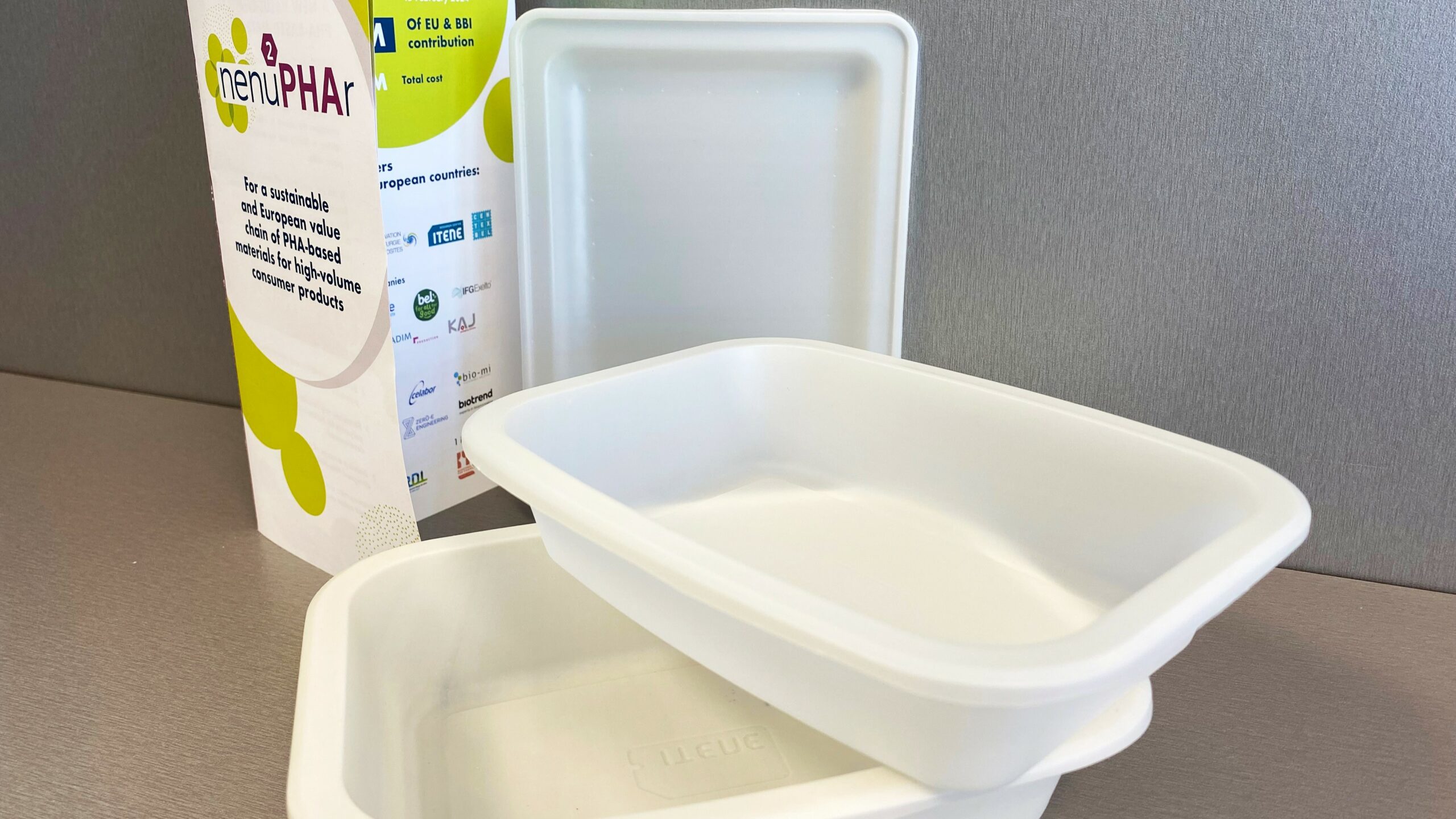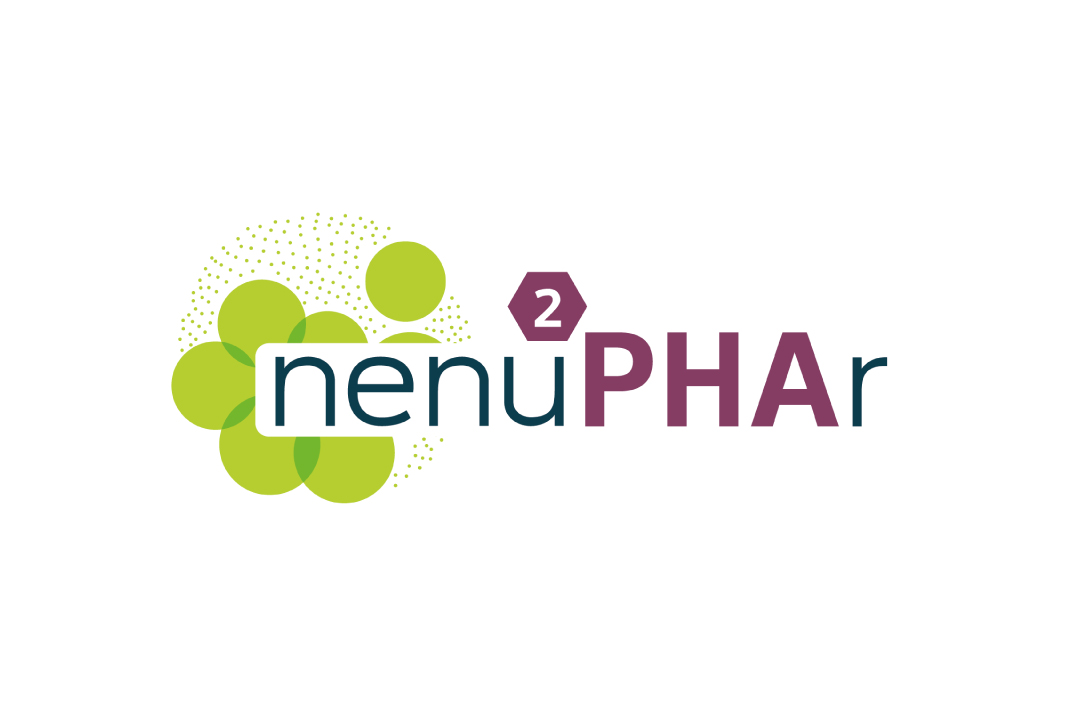NENU2PHAR: For a sustainable and European value chain of PHA-based materials for high-volume consumer products

Context
The Paris Agreement, signed in 2015 and legally binding for the signatory countries, aims to work to prevent the increase in the average global temperature of the planet from exceeding 2ºC with respect to pre-industrial levels and seeks to promote additional efforts to ensure that global warming does not exceed 1.5ºC. To this end, the signatory countries to this pact, developed within the framework of the United Nations – among them Spain – are committed to reducing greenhouse gas emissions.
According to the European Commission, half of total greenhouse gas emissions and more than 90% of biodiversity loss and water stress come from the extraction and processing of resources.
For this reason, the European Bioeconomy sector is creating new sustainable value chains and supporting the development of bioplastics in a cost-effective way. In addition, work is being done on the recovery of waste in general and the end-of-life of plastic packaging.
This is in line, with the transition towards a circular economy in which the use of natural resources for the manufacture of products is reduced. This is possible by giving waste a second life in the form of new materials with new applications, including packaging.
As a result, new bioplastics based on bacteria, fungi and algae have emerged, which do not present contraindications for crops (they are not crops that can be consumed by humans), have a lower carbon footprint and are adapted to sustainable waste management options such as composting.
In this regard, a promising alternative is polyhydroxyalkanoates (PHA), a variety of renewable and biodegradable polyesters. They can be manufactured via a purely biotechnological route from a variety of carbon-rich biomass feedstocks. In addition, PHAs degrade spontaneously in seas and rivers.
Summary and objectives
The overall objective of the NENU2PHAR project is to develop viable alternatives to current petrochemical-based plastics that are sustainable and biodegradable. Specifically, algae cultures will be created ex profeso, which will be consumed by bacteria also bred to produce PHAs.
The project has several specific objectives:
- To develop a competitive source of PHAs polymers that is sustainable from both an environmental and economic perspective. This will allow them to be used for mass-market products.
- To formulate and functionalise the polymers for the development of masterbatches and composites to ensure that the material is processable on conventional equipment and can meet the needs of plastic product manufacturers.
- Identify the processes necessary to ensure that PHA-based materials achieve functional pDevelop a series of eco-engineered product prototypes based on PHA that are suitable for mass-market products, optimising material selection, design and process definition to reduce both waste and environmental footprint.
- Demonstrate the suitability of the value chain developed by the NENU2PHAR project for the circular economy, exploring end-of-life scenarios such as composting, recycling or reuse of materials.
Consortium
The NENU2PHAR project brings together 17 partners from 7 European countries (5 large companies, 6 SMEs, 5 research centres and 1 cluster), each of them leaders in different research fields, from biomass development to biopolymers formulation and plastic processes.
1. Commissariat à l’Energie Atomique et aux Energies Alternatives-CEA (France). Coordinator.
2. Centre Technique Industriel de la Plasturgie et des Composites (France).
3. Université de Bretagne Sud (France).
4. Association Industries et Agroressources (France).
5. Elixance Masterbatches (France).
6. Danone Research SAS (France).
7. Packaging, Transports and Logistics research Centre- ITENE (Spain).
8. Lomartov SL (Spain).
9. Zero Emissions Engineering BV (The Netherlands)
10. Celabor SCRL (Belgium).
11. Centre Scientifique & Technique de l’Iindustrie Textile Belge (Belgium).
12. Sofradim Production SASU (France).
13. IFG Exelto (Belgium).
14. Kaj Zoo (Poland).
15. Bio-Mi Drustvo S Ogranicenom Odgovornoscu za Proizvodnju, Istrazivanjei Razvoj (Croatia).
16. Biotrend-Inovacao e Engenharia em Biotecnologia SA (Portugal).
ITENE’s role
The NENU2PHAR project is divided into nine work packages (WP) and ITENE will participate in several of them. Thus, the technology centre will support CEA (the coordinator) in all the tasks of WP1, whose purpose is the correct coordination and management of the project.
On the other hand, ITENE will lead WP4 and will work on the formulation of biopolymers, their characterisation, and the optimisation of the developed materials, so that they meet the requirements of the products to be developed.
In WP5 and WP6, ITENE will collaborate with the partner companies of the project to obtain sustainable packaging by means of different processing techniques, starting from the materials obtained in the previous WP.
In WP7, ITENE will evaluate the compostability and biodegradability, as well as the possible chemical recycling, of the different products obtained throughout the project, in order to identify the most appropriate end-of-life solution.
Furthermore, ITENE will support the WP leaders and the project coordinator in the exploitation and dissemination (WP9) and in the definition of the market requirements, as well as in the sustainability assessment of the project.
Results
Through the project, it has been possible to produce and refine starch from microalgae to serve as a fermentation substrate, creating fermentation processes that use microalgae starch hydrolysates as raw material. Methodologies have been defined for the extraction and purification of PHA using more environmentally friendly solvents than conventional chlorinated solvents. In order to meet the needs of the 8 target products, formulations have been designed based on the PHA obtained, taking into account both the processability through the corresponding processing techniques and the final requirements of each application.
ITENE, in addition to leading the formulation of these materials, has worked on the development of reinforcements, such as starch and cellulose nanocrystals, to optimize the barrier properties of those applications with higher requirements.
As a result, PHA-based materials have been obtained for the following applications: thermoformed trays for sliced cheese with their corresponding lidding film, thermoformed jars for compote-type products, films for yogurt stand-up pouches, injected roll-on containers for cosmetic products, agrotextiles, flexible and rigid materials for 3D printing and medical meshes. In addition to ensuring the functionality of the materials to replace products made from current non-renewable source materials, their end-of-life has been validated.
Firstly, strategies have been defined to improve the classification of these materials in waste streams, including the development of fluorescent markers by ITENE. Industrial/domestic compostability, mechanical recycling and chemical/enzymatic recycling of the final materials have also been studied, determining the most appropriate end of life in each case.

